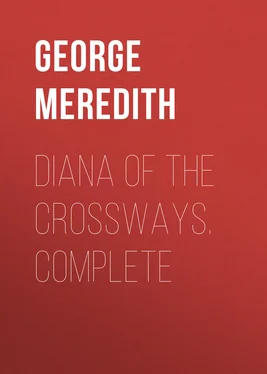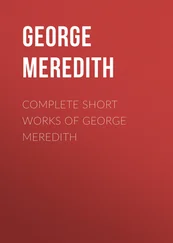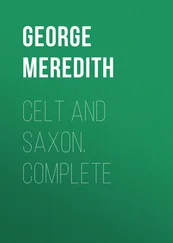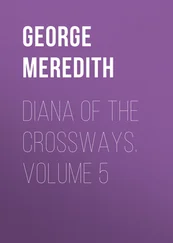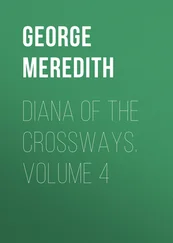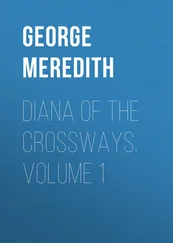George Meredith - Diana of the Crossways. Complete
Здесь есть возможность читать онлайн «George Meredith - Diana of the Crossways. Complete» — ознакомительный отрывок электронной книги совершенно бесплатно, а после прочтения отрывка купить полную версию. В некоторых случаях можно слушать аудио, скачать через торрент в формате fb2 и присутствует краткое содержание. Жанр: foreign_prose, literature_19, foreign_antique, на английском языке. Описание произведения, (предисловие) а так же отзывы посетителей доступны на портале библиотеки ЛибКат.
- Название:Diana of the Crossways. Complete
- Автор:
- Жанр:
- Год:неизвестен
- ISBN:нет данных
- Рейтинг книги:3 / 5. Голосов: 1
-
Избранное:Добавить в избранное
- Отзывы:
-
Ваша оценка:
- 60
- 1
- 2
- 3
- 4
- 5
Diana of the Crossways. Complete: краткое содержание, описание и аннотация
Предлагаем к чтению аннотацию, описание, краткое содержание или предисловие (зависит от того, что написал сам автор книги «Diana of the Crossways. Complete»). Если вы не нашли необходимую информацию о книге — напишите в комментариях, мы постараемся отыскать её.
Diana of the Crossways. Complete — читать онлайн ознакомительный отрывок
Ниже представлен текст книги, разбитый по страницам. Система сохранения места последней прочитанной страницы, позволяет с удобством читать онлайн бесплатно книгу «Diana of the Crossways. Complete», без необходимости каждый раз заново искать на чём Вы остановились. Поставьте закладку, и сможете в любой момент перейти на страницу, на которой закончили чтение.
Интервал:
Закладка:
The discovery was reached, and even acknowledged, before she could persuade herself to swallow the repulsive truth. O self! self! self! are we eternally masking in a domino that reveals your hideous old face when we could be most positive we had escaped you? Eternally! the desolating answer knelled. Nevertheless the poor, the starving, the overtaxed in labour, they have a right to the cry of Now! now! They have; and if a cry could conduct us to the secret of aiding, healing, feeding, elevating them, we might swell the cry. As it is, we must lay it on our wits patiently to track and find the secret; and meantime do what the individual with his poor pittance can. A miserable contribution! sighed the girl. Old Self was perceived in the sigh. She was haunted.
After all, one must live one’s life. Placing her on a lower pedestal in her self-esteem, the philosophy of youth revived her; and if the abatement of her personal pride was dispiriting, she began to see an advantage in getting inward eyes.
‘It’s infinitely better I should know it, Emmy—I’m a reptile! Pleasure here, pleasure there, I’m always thinking of pleasure. I shall give up thinking and take to drifting. Neither of us can do more than open purses; and mine’s lean. If the old Crossways had no tenant, it would be a purse all mouth. And charity is haunted, like everything we do. Only I say with my whole strength yes, I am sure, in spite of the men professing that they are practical, the rich will not move without a goad. I have and hold—you shall hunger and covet, until you are strong enough to force my hand:—that ‘s the speech of the wealthy. And they are Christians. In name. Well, I thank heaven I’m at war, with myself.’
‘You always manage to strike out a sentence worth remembering, Tony,’ said Lady Dunstane. ‘At war with ourselves, means the best happiness we can have.’
It suited her, frail as her health was, and her wisdom striving to the spiritual of happiness. War with herself was far from happiness in the bosom of Diana. She wanted external life, action, fields for energies, to vary the struggle. It fretted and rendered her ill at ease. In her solitary rides with Sir Lukin through a long winter season, she appalled that excellent but conventionally-minded gentleman by starting, nay supporting, theories next to profane in the consideration of a land-owner. She spoke of Reform: of the Repeal of the Corn Laws as the simple beginning of the grants due to the people. She had her ideas, of course, from that fellow Redworth, an occasional visitor at Copsley; and a man might be a donkey and think what he pleased, since he had a vocabulary to back his opinions. A woman, Sir Lukin held, was by nature a mute in politics. Of the thing called a Radical woman, he could not believe that she was less than monstrous: ‘with a nose,’ he said; and doubtless, horse teeth, hatchet jaws, slatternly in the gown, slipshod, awful. As for a girl, an unmarried, handsome girl, admittedly beautiful, her interjections, echoing a man, were ridiculous, and not a little annoying now and them, for she could be piercingly sarcastic. Her vocabulary in irony was a quiverful. He admired her and liked her immensely; complaining only of her turn for unfeminine topics. He pardoned her on the score of the petty difference rankling between them in reference to his abandonment of his Profession, for here she was patriotically wrong-headed. Everybody knew that he had sold out in order to look after his estates of Copsley and Dunena, secondly: and in the first place, to nurse and be a companion to his wife. He had left her but four times in five months; he had spent just three weeks of that time away from her in London. No one could doubt of his having kept his pledge, although his wife occupied herself with books and notions and subjects foreign to his taste—his understanding, too, he owned. And Redworth had approved of his retirement, had a contempt for soldiering. ‘Quite as great as yours for civilians, I can tell you,’ Sir Lukin said, dashing out of politics to the vexatious personal subject. Her unexpressed disdain was ruffling.
‘Mr. Redworth recommends work: he respects the working soldier,’ said Diana.
Sir Lukin exclaimed that he had been a working soldier; he was ready to serve if his country wanted him. He directed her to anathematize Peace, instead of scorning a fellow for doing the duties next about him: and the mention of Peace fetched him at a bound back to politics. He quoted a distinguished Tory orator, to the effect, that any lengthened term of peace bred maggots in the heads of the people.
‘Mr. Redworth spoke of it: he translated something from Aristophanes for a retort,’ said Diana.
‘Well, we’re friends, eh?’ Sir Lukin put forth a hand.
She looked at him surprised at the unnecessary call for a show, of friendship; she touched his hand with two tips of her fingers, remarking, ‘I should think so, indeed.’
He deemed it prudent to hint to his wife that Diana Merion appeared to be meditating upon Mr. Redworth.
‘That is a serious misfortune, if true,’ said Lady Dunstane. She thought so for two reasons: Mr. Redworth generally disagreed in opinion with Diana, and contradicted her so flatly as to produce the impression of his not even sharing the popular admiration of her beauty; and, further, she hoped for Diana to make a splendid marriage. The nibbles threatened to be snaps and bites. There had been a proposal, in an epistle, a quaint effusion, from a gentleman avowing that he had seen her, and had not danced with her on the night of the Irish ball. He was rejected, but Diana groaned over the task of replying to the unfortunate applicant, so as not to wound him. ‘Shall I have to do this often, I wonder?’ she said.
‘Unless you capitulate,’ said her friend.
Diana’s exclamation: ‘May I be heart-free for another ten years!’ encouraged Lady Dunstane to suppose her husband quite mistaken.
In the Spring Diana, went on a first pilgrimage to her old home, The Crossways, and was kindly entertained by the uncle and aunt of a treasured nephew, Mr. Augustus Warwick. She rode with him on the Downs. A visit of a week humanized her view of the intruders. She wrote almost tenderly of her host and hostess to Lady Dunstane; they had but ‘the one fault—of spoiling their nephew.’ Him she described as a ‘gentlemanly official,’ a picture of him. His age was thirty-four. He seemed ‘fond of her scenery.’ Then her pen swept over the Downs like a flying horse. Lady Dunstane thought no more of the gentlemanly official. He was a barrister who did not practise: in nothing the man for Diana. Letters came from the house of the Pettigrews in Kent; from London; from Halford Manor in Hertfordshire; from Lockton Grange in Lincolnshire: after which they ceased to be the thrice weekly; and reading the latest of them, Lady Dunstane imagined a flustered quill. The letter succeeding the omission contained no excuse, and it was brief. There was a strange interjection, as to the wearifulness of constantly wandering, like a leaf off the tree. Diana spoke of looking for a return of the dear winter days at Copsley. That was her station. Either she must have had some disturbing experience, or Copsley was dear for a Redworth reason, thought the anxious peruser; musing, dreaming, putting together divers shreds of correspondence and testing them with her intimate knowledge of Diana’s character, Lady Dunstane conceived that the unprotected beautiful girl had suffered a persecution, it might be an insult. She spelt over the names of the guests at the houses. Lord Wroxeter was of evil report: Captain Rampan, a Turf captain, had the like notoriety. And it is impossible in a great house for the hostess to spread her aegis to cover every dame and damsel present. She has to depend on the women being discreet, the men civilized.
Читать дальшеИнтервал:
Закладка:
Похожие книги на «Diana of the Crossways. Complete»
Представляем Вашему вниманию похожие книги на «Diana of the Crossways. Complete» списком для выбора. Мы отобрали схожую по названию и смыслу литературу в надежде предоставить читателям больше вариантов отыскать новые, интересные, ещё непрочитанные произведения.
Обсуждение, отзывы о книге «Diana of the Crossways. Complete» и просто собственные мнения читателей. Оставьте ваши комментарии, напишите, что Вы думаете о произведении, его смысле или главных героях. Укажите что конкретно понравилось, а что нет, и почему Вы так считаете.
